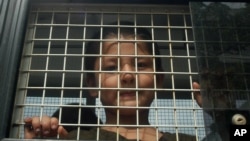Thailand’s military government Thursday confirmed the deportation of more than 100 ethnic Uighur people from western Xinjiang province back to China, a move condemned by rights groups and the United Nations. The deportation followed months of negotiations and came after more than 170 Uighurs were cleared to travel to Turkey last week.
The overnight deportation of more than 100 ethnic Uighurs to China occurred at a military Air force base after the groups were earlier transferred from several detention centers. The group comprised mostly men but included women and children.
Reports Thursday said Thai authorities used force to subdue the men who resisted as they were put on board the aircraft to China. The women were seen pleading with Thai authorities not to return to a country where many say they face persecution.
Thai Deputy Government spokesman Weerachon Sukondhapatipak said the decision to deport the group followed lengthy negotiations and adhered to “international processes.”
“As you are aware that last night around 100 people were sent back to China; these people are identified as having Chinese citizenship or they have been living or have the connection which is proof by evidence that they have been living in China for quite some time and according to the information we also receive from out counterpart as well, therefore we send them back as it appears in the news,” he said.
The group was part of some 370 of ethnic Uighurs held in Thai detention centers since their arrival some 18 months ago. According to the Munich-based World Uighur Congress, talks over the fate of the refugees had included Germany, the European Union, the United States, Turkey and China.
Last week some 173 ethnic Uighur, mostly women and children, traveled to Turkey amid hopes male members would soon follow. But Dolkum Isa, executive chairman of the German-based World Uighur Congress, said China has been increasing pressure on Thailand, raising fears over their welfare.
“Yes, yes, we are very concerned if they are sent back to China, are they safe? Because of the very bad experience in the past by the Chinese government and because the Chinese immediately give some label to all Uighur are separatists, terrorists. Yes, China is not the country of the rule of law because all the Uighur are just blamed [of being] in the same category,” said Dolkum Isa.
Increasing numbers of Uighurs have fled China citing persecution, making their way to South East Asia. The Uighur make up some 45 percent of the population in China’s western Xinjiang region. Chinese authorities accuse the Uighur of separatist acts of violence to establish an independent state.
The Thai decision to deport the Uighur has been condemned by international organizations and rights groups.
The U.N.’s High Commissioner for Protection, Volker Turk, said the U.N. body was “shocked” by the deportation. Sophie Richardson, China director of the U.S.-based Human Rights Watch, said Thailand had breached international human rights law.
“If in fact it is true the Thai government has sent these people back it has committed a grave violation of international human rights law. You do not send people back to a place where they have well founded fear of persecution. That is a black letter – it does not get any clearer than that,” she said.
As news reached Turkey of the Thai decision, angry protesters attacked the Thai honorary consulate general in Istanbul, smashing windows and pulling down the Thai flag. No injuries were reported.




